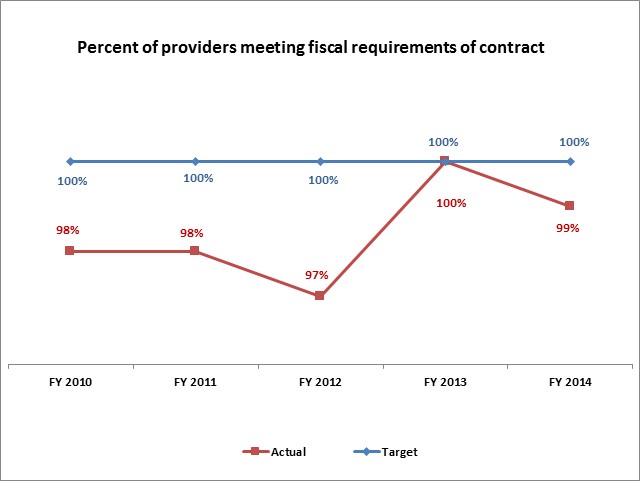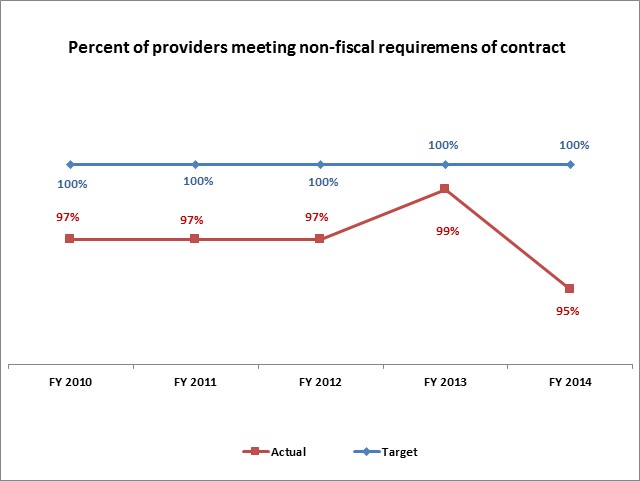The Community Supports (Medicaid Home and Community-based Services) Waiver allows states to provide services to individuals using Medicaid funds outside of standard institutional programs. Participants must be qualified for admission to an institution such as an ICF/ID. Assistance that may be provided under the waiver program includes a multitude of services ranging from family support to 24-hour residential care.
The following appropriation adjustments were made during the 2015 General Session:
For the most recent completed fiscal year, the following information represents the purposes for which the money was used:
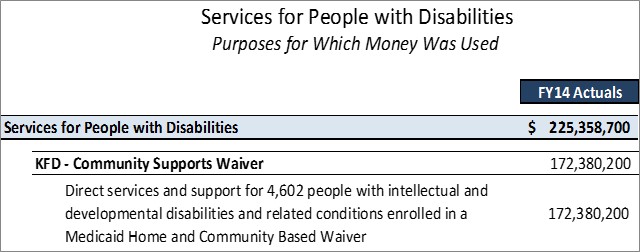
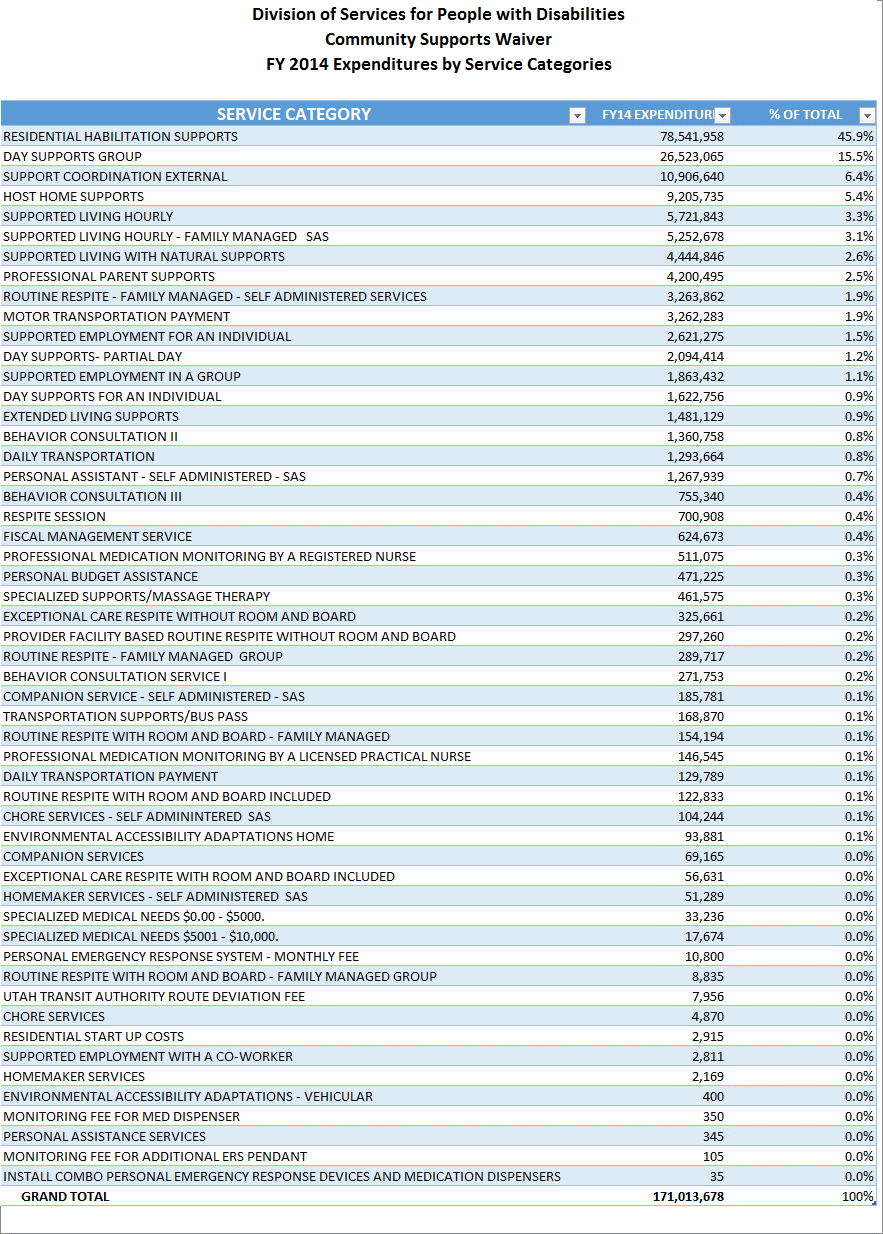
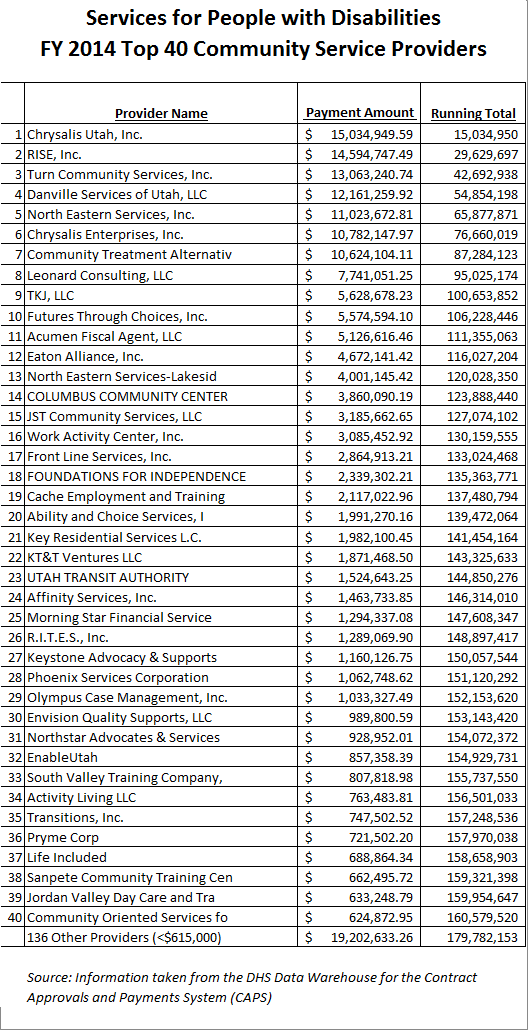
The Community Supports Waiver is considered a statewide program including all rural areas and is open to all residents of Utah with intellectual disabilities eligible for care. There is no statutory requirement for distribution of funds or allocation of slots by geographic region. The Division of Services for People with Disabilities (DSPD) "does not distribute funds based on location, but rather based on the unique needs of the individual receiving services. Persons are not brought into DSPD services based on location but rather the severity of their needs, and those with the most severe needs are brought into services first . . . DSPD serves Utahns in greatest need of services without consideration of their location."
Residential Services include five basic models which fall under two broad categories: 1) supported living and 2) supervised living.
- Supported Living -- Trained staff are available to provide support services as needed for less than 24 hours a day. There are two models of supported living services:
- Supervised Living -- Trained staff are available to provide supervision and support 24 hours a day. There are three models of supervised living services:
- Supported living arrangements: Consumers live independently in their own homes or apartments and receive periodic assistance and training with money management and other skills necessary for independent living.
- Supervised apartments: Consumers live in apartments with two or three people. Apartment supervisors are available to provide whatever assistance may be needed.
- Residential Habilitive Supports: Individually tailored 24 hour supports that assist with acquisition, retention, or improvement in skills related to living in the community. The services may be provided in group homes or supervised private residences.
- Professional parent homes: These are family homes in which one or two children beneath the age of 22 with disabilities live with 24-hour support in a very intensive habilitative family arrangement. The families are supported by trainers and consultants and also receive respite care.
- Host homes: These services are provided for individuals who turn 18 years of age but have been living in professional parent homes and wish to continue to live in that family home with other adults. The professional parent assumes more of a peer role with the individual and the individual works with the trainer in the acquisition of skills that allow independence as an adult. The person may receive support and/or supervision up to 24 hours per day.
Day Services programs take place in the community or in workshops and are designed to provide work opportunities as well as maintain skills in post-school years.
- Day programs - are designed to promote the ongoing development and maintenance of skills. The services may be provided in a variety of settings, including natural workplace settings throughout the community or at sheltered sites. Most participants in these programs receive federal funding through the Medicaid program. Care must be taken that the goals and objectives for each individual are not directed at teaching specific job skills. Medicaid will not pay for vocational training that is part of a day training program, though DSPD works closely in coordination with the Utah State Office of Rehabilitation to leverage available federal funding opportunities.
- Supported retirement - is designed for people who are age 55 or older or whose health prevents their continued participation in employment or day training. This program utilizes senior citizen centers, adult day centers, or other community programs that provide a variety of activities for seniors.
Supported Employment programs place people with disabilities in jobs in regular work environments. A job coach is assigned for each person to provide on-the-job training and to help solve problems that may arise. The cost of supported employment is $34.08 per job coach hour. In some cases, individuals are able to reduce the need for a job coach and may eventually handle a job on their own. For most individuals who enter this service, the Utah State Office of Rehabilitation in the State Office of Education funds the first 170 hours of training and the Division of Services for People with Disabilities provides the ongoing funding.
In-Home Support provides services to families that enable them to care for their children with disabilities at home. These services are provided through contract providers or by staff hired directly by parents. The individualized nature of the program does not allow for fixed rates or funding allocations. The annual average expenditure per consumer is about $15,582.
Transportation Services helps people with disabilities in getting from their homes to day programs, jobs, and other activities. The need for transportation assistance and the cost of transporting people is a frequently mentioned issue when public hearings are held on services for people with disabilities. This is especially true in the rural areas of the state.
The division has statutory authority to not lapse funds at the end of a fiscal year and will typically have some amount of Beginning Nonlapsing balance available. The statute restricts use of nonlapsing funds for one-time purposes unless authorized for ongoing expenditures by the Legislature.
COBI contains unaudited data as presented to the Legislature by state agencies at the time of publication. For audited financial data see the State of Utah's Comprehensive Annual Financial Reports.
